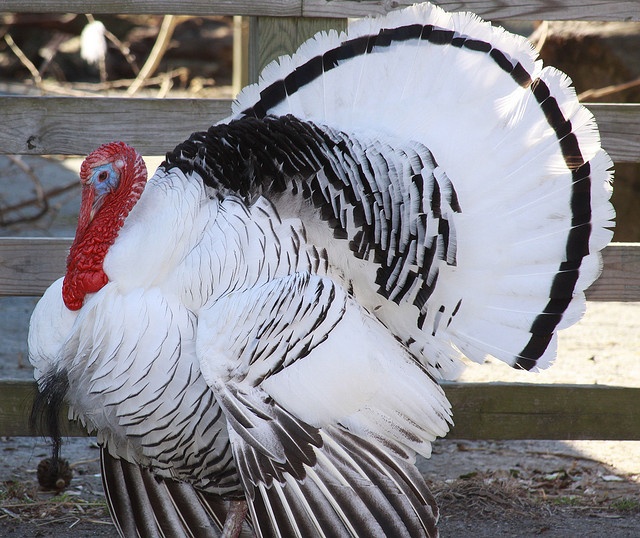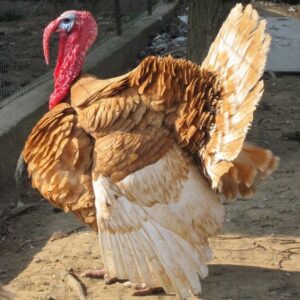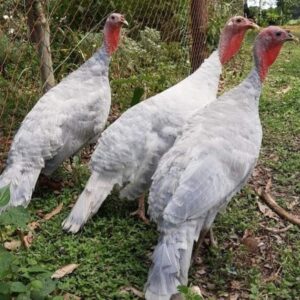Heritage Turkeys represent a collection of traditional turkey breeds raised for their historical, agricultural, and ecological significance. Unlike commercial turkeys bred for rapid growth and industrial production, heritage turkeys are genetically closer to their wild ancestors, prized for their natural behaviors, rich flavor, and adaptability to sustainable farming practices. These breeds include varieties such as the Bronze, Spanish Black, Narragansett, Bourbon Red, and more.
Defining Heritage Turkeys
The American Livestock Breeds Conservancy (ALBC) defines heritage turkeys as birds meeting specific criteria:
- Natural Mating: Heritage turkeys must be capable of natural reproduction without artificial insemination.
- Slow Growth: They require a longer growth period, typically 26–30 weeks, to reach market weight, allowing for full physical and flavor development.
- Long Lifespan: When raised in proper conditions, heritage turkeys can live a long, productive life.
These criteria ensure that heritage turkeys maintain their distinct genetic traits and traditional qualities, differentiating them from their commercial counterparts.
Physical Characteristics
Heritage turkeys come in various breeds, each with unique physical traits. However, they generally share these characteristics:
- Size: Smaller than modern industrial turkeys, toms typically weigh 15–25 pounds, and hens weigh 8–16 pounds, depending on the breed.
- Plumage: Heritage breeds exhibit a wide range of feather colors, from the shimmering bronze of the Bronze Turkey to the chestnut-red of the Bourbon Red.
- Body Structure: They have a leaner, more proportionate body compared to the Broad-Breasted White.
- Head and Neck: Their bare skin varies in color and texture, adding to their distinct appearance.
Temperament and Behavior
Heritage turkeys retain many of the natural instincts and behaviors of wild turkeys:
- Active Foragers: They thrive in free-range environments, grazing on grass, seeds, and insects, which enhances their flavor and reduces feed costs.
- Social and Intelligent: These turkeys are curious and sociable, forming bonds with flock members and even humans.
- Hardy and Adaptable: They are resilient to various climates and require minimal intervention in natural settings.
Habitat and Care
Heritage turkeys are well-suited for sustainable and free-range farming systems.
- Shelter: Provide secure, weatherproof housing to protect them from predators and extreme weather.
- Space: Ample space is essential to allow them to roam and express natural behaviors.
- Diet: Their diet should include grains and supplemental poultry feed, along with foraging opportunities.
- Health: Heritage turkeys are naturally robust and less prone to diseases compared to commercial breeds.
Productivity
Heritage turkeys are dual-purpose birds, valued for both their meat and eggs:
- Meat: Known for its exceptional flavor and texture, heritage turkey meat is leaner and more richly flavored than industrial varieties. It is a popular choice for gourmet meals and traditional holiday feasts.
- Eggs: While not prolific layers, hens produce 50–100 eggs annually, which are cream-colored and often speckled.
Breeding and Reproduction
Unlike commercial turkeys, heritage breeds reproduce naturally, with strong instincts and maternal care:
- Breeding Season: Toms display elaborate courtship behaviors, including gobbling, strutting, and fanning their tails to attract hens.
- Egg Incubation: Hens incubate eggs for 28 days and often brood and care for their poults.
- Poults: Young turkeys are hardy but require warmth and protection during their early development.
Conservation and Importance
Many heritage turkey breeds are listed by The Livestock Conservancy as endangered or at risk due to the dominance of industrial farming. Enthusiasts and sustainable farmers play a vital role in preserving these breeds through breeding programs and small-scale farming. By raising heritage turkeys, farmers contribute to biodiversity, ecological balance, and the preservation of agricultural history.
Culinary and Cultural Value
The longer growth period and diverse foraging diet of heritage turkeys result in meat with superior texture and flavor. Their lean, flavorful meat is sought after for gourmet dishes and traditional feasts, representing a return to the rich culinary heritage of earlier times.
Conclusion
Heritage Turkeys are more than just livestock—they are living links to the past, embodying agricultural traditions and sustainable practices. With their unique appearance, natural behaviors, and exceptional meat quality, they are an excellent choice for farmers, conservationists, and food enthusiasts seeking a deeper connection to history and the land.
Buy Heritage Turkey online, purchase live Heritage Turkey, order premium Heritage Turkey, premium traditional turkeys for sale, heritage poultry breed, best heritage turkeys for sale, heritage turkey hatchery, buy live turkeys online, order heritage turkey now, premium turkey suppliers










Reviews
There are no reviews yet.